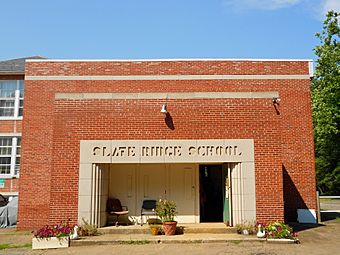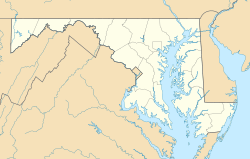Whiteford–Cardiff Historic District facts for kids
Quick facts for kids |
|
|
Whiteford–Cardiff Historic District
|
|

Art Deco gym or meeting hall attached to older Slate Ridge School (now an apartment building)
|
|
| Location | MD-PA, Whiteford Rd., Platted Parry St., Quarry Rd., W of Main St., Whiteford, Maryland |
|---|---|
| Area | 311 acres (126 ha) |
| Built by | Simonson, Otto G. |
| Architectural style | Late Victorian, Colonial Revival |
| NRHP reference No. | 05001278 |
| Added to NRHP | November 15, 2005 |
The Whiteford–Cardiff Historic District is a special area in Harford County, Maryland. It includes parts of two towns, Cardiff and Whiteford. This district is important because it shows what life was like in the late 1800s and early 1900s.
This area was once famous for making slate, a type of rock used for roofs and other things. It also has a strong connection to Welsh culture. Many people from Wales settled here long ago.
Contents
What is a Historic District?
A historic district is like a special neighborhood or area. It has buildings, places, or objects that are important to history. These places are protected so people can learn about the past. The Whiteford–Cardiff Historic District was added to the National Register of Historic Places in 2005. This means it is officially recognized for its historical value.
A Look Back: Slate and Welsh Heritage
The towns of Whiteford and Cardiff were very important for making slate. Slate is a strong, flat rock. It was dug from quarries and used for many things, like roofing tiles and blackboards. This industry helped the towns grow.
Many people who worked in the slate quarries came from Wales. They brought their culture and traditions with them. This strong Welsh identity can still be seen in the area today. It is reflected in the way some of the buildings were designed.
Buildings and Homes
The Whiteford–Cardiff Historic District has 140 important historical features. These include old buildings, homes, and other structures. Among them are four unique Welsh cottages. These cottages were built around 1850. They show the simple, traditional style of homes from Wales.
The architecture in the district also includes styles like Late Victorian and Colonial Revival. These styles were popular in the late 19th and early 20th centuries. They add to the unique look of the area.
See also
 | Jessica Watkins |
 | Robert Henry Lawrence Jr. |
 | Mae Jemison |
 | Sian Proctor |
 | Guion Bluford |



